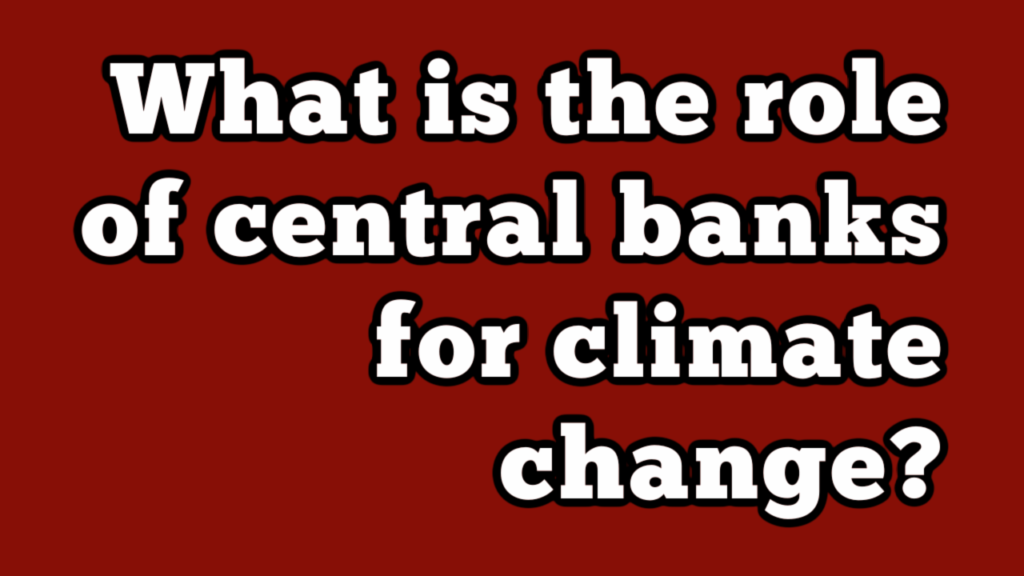What is the role of the central banks for climate change?

– The central banks have a role to play for climate change.
– The Fed Reserve has created two panels, one focused on financial stability risks and the other on climate stress tests.
– The NGFS has issued a paper with 9 ways that central banks can factor in climate-related risks.
As noted in this Reuters article, the Federal Reserve has recently established two panels focused on climate risks to the US financial system and individual firms, one focused on financial stability risks and the other looking into the possibility of climate stress tests for banks.
Here is a note from Nick Robins of Investor Watch about the central banks’ role in climate change:
Central banks and financial supervisors need to play a key role in delivering the transition to net zero To find out more, take a look at the launch event for our Net Zero Central Banking report with Minouche Shafik, Director of The London School of Economics and Political Science (LSE) ,Luiz Pereira Da Silva Bank for International Settlements – BIS, Sarah Breeden Bank of England, Ulrich Volz SOAS University of London and myself.
Michael Hugman wrote this comment on this note:
Hugely important work Nick. We can no longer be constrained by backward looking inflation targeting frameworks and treat them as somehow carved in stone. Financial (and societal) stability will be completely undermined unless there is direct action from central banks. All banks should be regulated to have transition plans, to get full disclosure from all of their clients and to phase out fossil fuels. The climate transition will simply not happen otherwise.
And this piece from the NGFS (Network for Greening the Financial System) offers nine ways for central banks to adapt monetary policy to factor in climate-related risks.
And back in February, Lael Brainard – a member of the Federal Reserve’s Board of Governors – delivered this speech entitled “The Role of Financial Institutions in Tackling the Challenges of Climate Change.”
Here is an excerpt:
“Ultimately, moving toward standardized, reliable, and mandatory disclosures could provide better access to the data required to appropriately manage risks. ***
Building on previous reports on climate-related risk-transmission channels in the financial system, with a particular focus on amplification mechanisms and cross-border effects, the FSB is now assessing the availability of data through which climate-related risks to financial stability could be monitored, as well as any data gaps. In addition, the FSB is exploring ways to promote globally comparable, high-quality and auditable standards of disclosure based on the recommendations in the TCFD.
And then here is a note from Harald Walkate:
Interesting counterpoint to the recent narrative about central banks’ role in tackling climate change from Mervyn King (former BoE Governor) on Capitalisn’t podcast (Luigi Zingales & Bethany McLean.) “You need to ask the question ‘what’s going on here?’ Does this [problem] justify a monetary policy response? To give you an example, the number of central banks that have gone public in embracing actions against climate change seems to me almost a political move. It *is* important we take actions to deal with [climate change], but it is not something for *this* organization.
Governments have to be responsible for a carbon tax or other measures, other organizations should be asked to deal with it. If we jump on the climate change bandwagon, we will lose our focus and talented people will spend more time worrying about that than about monetary policy.
That is exactly what went wrong before the financial crisis where many regulators took their eye of the ball of prudential regulation. The image in my mind is kids playing soccer: they are all all running in the same direction chasing the ball. That’s what’s wrong with policy. When you watch a professional game, you see the players spread out, each doing their own thing. That’s what policymakers need to do as well.
Also see this note by Arun Kelshiker about the World Bank’s report on climate-related risks for Ministries of Finance…
